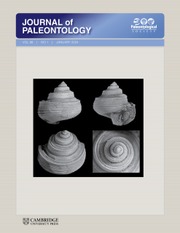Tricia Kelley has never been afraid to dive in—as the only woman student in Harvard's all-male paleontology Ph.D. program, into marriage and lifelong partnership with Jonathan Kelley as part of a two-career couple, into teaching and research as the first woman faculty member in the Department of Geology and Geological Engineering at the University of Mississippi, into motherhood, and into leadership, first as Director of the NSF-EAR Geology and Paleontology Program, next as Department Head of Geology and Geological Engineering at the University of North Dakota, later, as Department Head of Earth and Ocean Sciences at the University of North Carolina Wilmington. Throughout her long and successful career of teaching and research, service to the Paleontological Society and to our field is a recurring theme. Today, we acknowledge that service, by honoring her with the Pojeta Award, established in memory of John and Mary Lou Pojeta, to recognize exceptional professional or public service in the field of Paleontology.
Many of you will recognize Tricia as one of our past presidents. Under Tricia's leadership in 2000–2002, the Society began its perilous journey from print to online journals, which eventually resulted in our current partnership between the Paleontological Society and Cambridge University Press, negotiated by President Sandra Carlson, a happy ending if there ever was one. But wait, there's more. Tricia's first job for the Society was to chair the nominating committee of the Southeastern Section in 1981. Along the way, she's done almost everything you can do for the Paleontological Society. Some of the highlights include: serving as a Technical Editor of the Journal of Paleontology from 1989–2000, and as a Paleontological Society Distinguished Lecturer twice, once in the mid-1990s, and then again from 2006 until the present. She has organized three Paleontological Society short courses: The Evolution-Creationism Controversy II: Perspectives on Science, Religion, and Geological Education (1999); The Fossil Record of Predation (2002); From Evolution to Geobiology: Paleontology at the Start of a New Century (2008). Add to that 14 topical sessions and symposia at GSA and other meetings, and three major field trips: Miocene Strata of the Calvert Cliffs (for the GSA Penrose Conference: Linking Spatial and Temporal Scales in Paleoecology and Ecology); Plio-Pleistocene Stratigraphy and Paleontology of Southeastern North Carolina (for the Southeastern GSA 2011 meeting); and Neoichnology of Edisto Island, South Carolina: Eat, Prey, Love, Burrow (for the Southeastern GSA 2019 meeting). She served on our Financial Management and Investment Committee twice (1992–1994, 1997–2000), the Second Century Development Committee, which resulted in $250,000.00 dollars to support student and international paleontological research, and today serves as co-chair of our current Development Committee.
Her significant contributions to our field as a whole include her work as Associate Editor of Palaios (2002–present), memberships on the editorial boards of Geology (1997–2000) and Palaeogeography, Palaeoclimatology, Palaeoecology (2014–2017) as well as her service as Vice-President and President of the Board of Trustees of the Paleontological Research Institution (2006–2008).
Early in her career, Tricia Kelley recognized the pivotal role that John Pojeta played in the Paleontological Society, confessing to me that he was the paleontologist she most wanted to emulate. John Pojeta recognized that the Society depends on members willing to dive in and do essential things. He was always thinking about what we needed to do, and how we needed to change to stay strong and relevant. He was an early voice in support of a profession-wide paleontological code of ethics, for including amateurs as members, and for a Paleontological Society that not only publishes fundamental research, but also advocates for Paleontology as a field and profession. As the seventh recipient of the Paleontological Society Pojeta Award, Tricia Kelley exemplifies both John Pojeta's extraordinary service to, and his broad, creative vison for the Paleontological Society.
October 26, 2020





